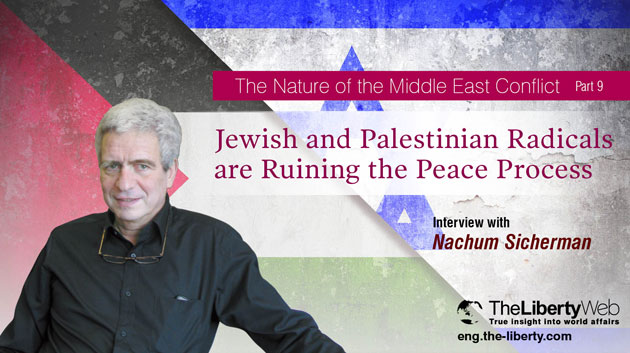Radicals from Both Israel and Palestine are Ruining the Peace Process
We asked Mr. Sicherman, who teaches at Columbia University, the status of the Middle Eastern conflict and the direction of the Peace Process.

Nachum Sicherman
Jewish American. Masters in 1982 from Israel’s Hebrew University. Ph.D in 1985 from Columbia University. His expertise is in economics, and has been researching the relationship between education and the labor market. Practices karate as a hobby.
Q: What is your view on the direction of the Israeli-Palestinian peace process?
A: There are radicals in both the Israeli and Palestinian camps who have been ruining the various peace negotiations that have taken place over the years.
Their views are similar to that of quarrelling children. They keep saying “You started it”. But if you look back far enough in history, both sides have attacked each other. So both sides can make that same claim, and the process never moves forward.
For example, when Israel had one of its soldiers kidnapped, they bomb the entire are where the kidnapping occurred. I was surprised that even one of my moderate friends were claiming that “they fired the rockets first, so our response is reasonable”.
Ask ourselves when and how this should be stopped
Q: What is your view of Hamas, which continues to attack Israel?
A: The majority of Israelis believe that “Hamas is trying to destroy Israel”. But the moderates also think that “maybe we cornered them into radicalization”. In order to solve this problem, we need to ask ourselves “when and how this problem can be stopped”.
But Israeli public opinion rejects negotiations when things are calm, thinking “”the status quo is good enough”. But once the attacks begin, they say “negotiations are impossible”. Part of the problem resides in this attitude.
Also, part of Israeli Prime Minister Netanyahu’s political base resides in the right-wing and conservatives, so he’s unable to negotiate peace with Palestinian President Abbas.
Settlements in the West Bank should be halted
When I was a university student, I studied under the Jewish philosopher Yeshayahu Leibowitz. He was one of the original faculty from when Hebrew University was founded, and was a guru for the moderate students. He was against the Jewish settlements in the West Bank that’s currently causing problems.
In 1967, Israel occupied the West Bank, but he was one of the first to claim that “we should withdraw from the West Bank immediately. Otherwise it will cause problems for us in the future.” His statement was made in the midst of joyous proclamations inside Israel about how “we took back our land”.
If one considers how the West Bank settlements continue to be a problem for us today, the statement carried incredible foresight. He also stirred up controversy when he called the settlers “Judeo-Nazis”.
Israeli Arabs aren’t treated the same as Jews
What is the situation of Israeli Arabs, who are 20% of Israel’s population?
One the face of it, Israeli Arabs are equal to Jews. They have citizenship, and the Arabic language is one of the official languages.
But in reality, they aren’t treated as equals. Many believe that even if the Palestinian conflict is resolved, the status of Arabs inside Israel will become the next point of contention.
I remember receiving education that “while Jews seek peace with Arabs, the Arabs aren’t interested in peace. So the blame lies with them.” Also, marriage between Jews and Arabs is very rare. In order for Jews to marry a Muslim or a Christian, they have to convert first. Even if they get married overseas without converting, in many cases, they are unable to adopt to the conditions inside Israel, and are forced to immigrate to places like Spain.
During the Gaza War of 2014, the right-wing in Israel submitted a bill that removes the Arabic language from one of the official languages. Both Prime Minister Netanyahu and Defense Minister Ya’alon opposed the bill, but that became the reason why an election is needed in March 2015. The status of Arabs influenced national politics.
The roadmap to a peace process cannot be found.
Q: Where will peace negotiations head next?
The peace negotiation could be compared to a quarrelling couple. The question at hand is “do you want to be righteous? Or do you want to live together?” Saying that the other side is wrong a million times won’t solve the problem.
Many Israelis, including myself, try to stay optimistic about peace. But the reality is that, at least at the moment, it’s not clear how that peace can be realized.



















